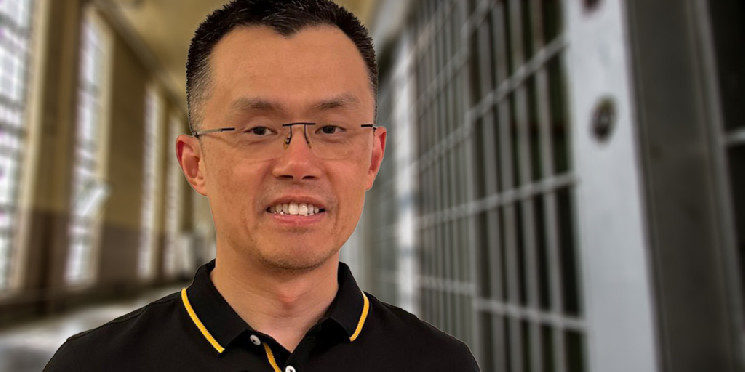Only weeks ago, a Manhattan jury found disgraced FTX founder Sam Bankman-Fried guilty of seven counts of fraud and conspiracy, setting the fallen Silicon Valley darling up for a potentially lifelong stint in a brutal federal penitentiary. Will his longtime rival end up behind bars, as well?
Today, in a shocking development, Binance CEO Changpeng Zhao agreed to a settlement with federal prosecutors—one that required him to plead guilty to violating criminal U.S. anti-money-laundering laws.
Now, the once-unthinkable is suddenly a real possibility: Are the two wealthiest men in crypto’s history about to become prison bunkmates?
While the ultimate decision as to Zhao’s carceral fate is now solely in the hands of the Seattle federal judge that accepted his guilty plea earlier today, there are certain factors—and historical precedents—that indicate how the crypto billionaire’s next few years might shake out.
Violations of the Bank Secrecy Act, which requires financial institutions to implement certain measures to prevent and deter money laundering, carry a maximum prison sentence of five years. In theory, Zhao, who pled guilty today to violating the Act, could be looking at five years in an American federal prison—but there are several indicators that he won’t be slapped with the maximum penalty.
For one, while Zhao is now barred from maintaining an executive role at Binance as a condition of his deal—he’ll have to resign as CEO—he will also be permitted to retain his majority ownership of Binance, the largest crypto exchange in the world.
Such a concession on the Justice Department’s part indicates some willingness from the federal agency to meet Zhao at least partway, in the interest of getting an historic settlement with Binance on the books. And while federal prosecutors will not determine what amount of time, if any, Zhao will spend in prison, they do have the ability to lobby the case’s judge regarding sentencing.
While sources at the Justice Department told The New York Times Tuesday that the agency will seek an 18-month sentence for Zhao, that's no guarantee the Binance co-founder will see the inside of a prison. In similar past criminal cases regarding crypto and money laundering, where prosecutors have pushed for a substantial prison sentence, those requests have been rebuffed.
Last year, for example, in a case with substantial similarities to Zhao’s, crypto executive Arthur Hayes pled guilty to violating the Bank Secrecy Act while leading prominent crypto exchange BitMEX. When probation officers recommended no prison time and two years of probation for Hayes, based in part on the crypto executive’s lack of a criminal record, prosecutors pushed back vigorously, beseeching the case’s judge to reject the proposal and hand Hayes a hefty, multi-year prison sentence.
The judge ultimately ignored prosecutors’ requests; Hayes was sentenced to six months of house arrest and two years of probation.
Like Hayes, Zhao also has no prior criminal record. Also like Hayes, Zhao agreed today to pay a fine, here of $50 million (Hayes agreed to pay $10 million).
It looks then like Zhao may be headed for a similar arrangement—one involving some combination of probation and potentially house arrest.
The Binance co-founder certainly doesn't appear to be anticipating spending any time behind bars, at least publicly. In a Twitter post Tuesday afternoon, Zhao said he plans, in the coming months, to take some much-needed vacation, "do some passive investing" in blockchain, DeFi, AI, and biotech startups, and potentially become a mentor to a few developing entrepreneurs. Donning an orange jumpsuit was not listed among those plans.
Today, I stepped down as CEO of Binance. Admittedly, it was not easy to let go emotionally. But I know it is the right thing to do. I made mistakes, and I must take responsibility. This is best for our community, for Binance, and for myself.
Binance is no longer a baby. It is…
— CZ 🔶 Binance (@cz_binance) November 21, 2023
Even if Zhao somehow gets hit with a non-zero amount of prison time, though, those hopeful for a jailyard reunion between the Binance CEO and his one-time nemesis Bankman-Fried are likely to be disappointed.
Criminals sentenced to 10 years or less in federal custody are placed in minimum-security federal penitentiaries, which house non-violent offenders in dorm-style housing and offer a relatively decent quality of living, according to legal consultant Christopher Zoukis. Even if Zhao got the worst deal possible, that’s where he’d be headed.
Bankman-Fried, on the other hand, looks set for a decades-long stint at a medium-security federal prison, where extreme gang-related violence can be common, and inmates are locked in heavily guarded cells.
Edited by Andrew Hayward
 decrypt.co
decrypt.co
